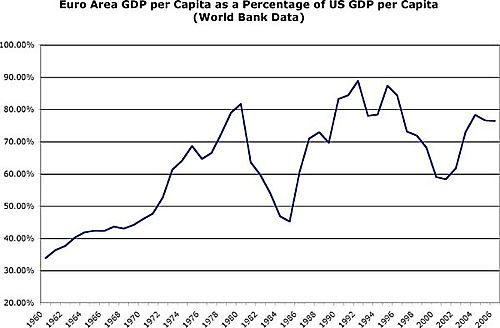Finally! Someone has come back at me (well he didn’t know he was talking to me) with the key, perhaps-trumping argument on my Europe vs. US longatribes. I gave this argument away in a previous post, hoping someone would pick it up, but have yet to hear it well enunciated elsewhere.
Summary of my arguments: the US and Europe have been growing at the same rate for decades, despite huge disparities in tax burdens (28% versus 40% of GDP), and profound, systematic differences in social support systems. Sort of suggests that their system is not the disaster, growth-wise, that many like to believe it is.
Ian Maitland (I’m assuming it’s this Ian Maitland) comments on a Brad DeLong post:
How does that square with this (from The Economist, “Old before their time,” 5-11 March 2005, p. 73)?: “In the post-war years to the 1980s, the world’s richest economies were mostly converging towards similar levels of income per person. During the 1990s, however, that convergence came to a halt. Nowadays, income per person in the euro area is around 30% less than in America… And average growth rates in the euro area lagged behind
America’s in the ten years to 2003.”
Brad says that: “Western Europe … has chosen politically to have a lot more leisure time than the United States.”
Isn’t it more accurate to say that Europe has “chosen politically” to take away people’s choices, say, regarding whether or not to continue working after they are 60? In the same article we read: “The OECD has attempted to measure the implicit ‘tax’on working for someone nearing retirement age…. For 55-year-olds in Germany or France, this implicit tax amounts to 50% of the average wage for people in that group. For 60-year-old Dutch people, the loss of benefits is 90% of the wage; Belgians face an effective tax rate of 80%. Faced with such arithmetic, why should older people bother to work?… If the EU does reduce the obstacles to work, many Europeans might still choose to toil less than Americans. But that would be an entirely different matter–a choice made freely, rather than in response to powerful government-supported incentives.”
Okay, point by point:
Correct. (Though I’d say the catchup ended in 1980. They did hit almost 90% of US GDP in a couple of years in the 90s, but right now they’re about even with ’80.)

There was a big, easily explicable European catchup effect for three decades after the war. They’ve been pretty much stuck, comparatively, ever since.
As I demonstrated, you can cherry-pick your periods as you wish. Which is what our Economist correspondent did here. While I rarely recommend ignoring The Economist, you really should so in this case.
The numbers I’ve run suggest that Europe runs more like 25% behind, but that’s just noise. This is the crucial question for all us teat-sucking socialists: Why can’t Europe catch up?
There are many many factors, but it’s really a simple answer, and both Ian and Brad are right: each “capita” works less in Europe than in the U.S. This is both a good and a bad thing.
I like Bernard Wasow’s quote:
The Europeans prefer free time, while American’s prefer big houses and big cars. Fine.
But the fact is–and both Brad and Ian stipulate to this, at least implicitly–to a great extent the society you live in imposes that choice on you. Sure, Europe has in many cases removed the option of people choosing “whether or not to continue working after they are 60.” But the U.S. has effectively removed the option of working 35-hour weeks and taking six-week vacations. (Milton Friedman’s obsession with coercion is well-placed, but he fails to realize–or at least acknowledge–that coercion goes beyond the physical; any economic system is coercive.)
Europeans have chosen leaders who instituted policies that provide (and to some extent require) what they care about. Ditto in the U.S.
But preferences are changing in this country, and globalization is coercing those changes–especially on those of more modest means. The quarter-acre lot with two or three cars is beyond the reach of most people these days, absent dual incomes and long hours/multiple jobs.
Given that reality, more people are liking the looks of the European system. Yeah, you have to give up the house/castle idea. But what do you get in return? The time to do things that—pretty much everybody agrees–actually provide a joyous life. If I have to be coerced, that’s what I’ll choose.
One last thing that really sticks in my craw: Each society is free to choose what it prefers. But when Europeans have so much time to spend with their families and friends–and when they do in fact use that time for that purpose (think: long, liesurely afternoon lunches at tables filled with loved ones, lounging in pleasant city courtyard cafes as your neighbors stroll by to chat)–how dare American get-back-to-work conservatives crow about their devotion to “family values”?
Comments
One response to “Europe vs. U.S.: Family Time Versus Four-by-Fours and Two-by-Fours”
[…] Seconds 0 to 16: Prosperity and slacking? YES! Large-scale leisure funded by the productive classes is like a free lunch. […]